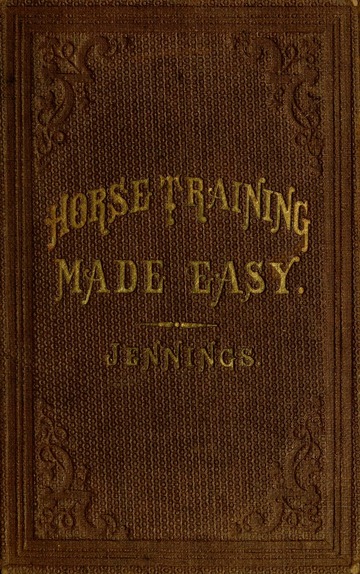
|
L’ouvrage est entièrement numérisé et disponible sur le site : |
||||||||
|---|---|---|---|---|---|---|---|---|---|
| Horse training made easy — 1866 / JENNINGS Robert, 1866 | |||||||||
Horse-Training Made Easy : Being a New and Practical System of Teaching and Educating
the Horse. Beautifully illustrated with forty-four engravings. Whip-training, or how
to drive without reins ; how to make a horse trot honest, &c. By Robert Jennings,
veterinary surgeon; professor of pathology and surgery in the Veterinary college,
Philadelphia : lecturer on veterinary medicine in the Agricultural college, pa, Author
of "The horse and his diseases," "Cattle and their diseases," " Sheep, swine, and
poultry," etc. To which is appended an Essay on Shoeing ; also the Symptoms and Treatment
of the Various Diseases of the Horse, Embracing a Full and Complete History of Glanders.
/
JENNINGS Robert
|
|||||||||
|
|||||||||
| Anglais |
« The art of training horses has, until within the last few years, heen attended with
much cruelty and bad management. The system known as
Rarey
’s, though practised in this country for many years, was made popular by Mr. J. S.
Rarey, to whom we willingly accord all the credit which is justly due him. His success
has given a new impulse to the inventive minds of horsemen, and, like almost all other
discoveries, the original is lost sight of in the improvements which follow it.
The Rarey system is one purely of subjugation and exhaustion the spirit of the animal
is thus often broken. On the contrary, our new system is one of education, embracing
the practical portions of all the various systems known to man, from that of Sullivan
the Irish whisperer, down to the more modern systems, of the present day. The animal
is first taught what is required of him, and, as soon as he is made to understand,
he becomes a willing subject. To attempt to force him to do that which he does not
comprehend, is »to excite him to resistance, a circumstance always to be avoided;
hence the many baulky, kicking, and otherwise unruly horses.
The Rarey system requires a man of nerve and determination to handle a horse successfully,
which requisites few men possess. Ours enables a boy fifteen or sixteen years of age
to handle, and break to harness, the wildest animal. Strength and courage are not
essential; but patience, perseverance, and kindness are required. The man who is void
of patience cannot control and win the confidence of his horse.
There is no other system known to man by which a horse can be trained to drive without
bridle, bit, or reins, guided simply by motions of the whip. This principle is so
simple, that any intelligent person can practise it successfully on any intelligent
horse. To make a horse trot honest is also part of our system, it being original with
us. We have never known it fail. In March, 1865, I presented this subject to the consideration
of the Philadelphia Society for Promoting Agriculture, and to the Philadelphia Riding
Club, both of which institutions highly indorse it. Within the last year it has been
greatly modified and improved, rendering it the most complete and practical system
ever presented to the public.[…] » Présentation de l’éditeur (1866)
« New York, 1872. » Huth (1887)
: attelage , comportement , critique , débourrage , défense du cheval , ferrage , jeune cheval , maladies , méthode , parage , Rarey , résistances du cheval , rétivité , tirer au renard